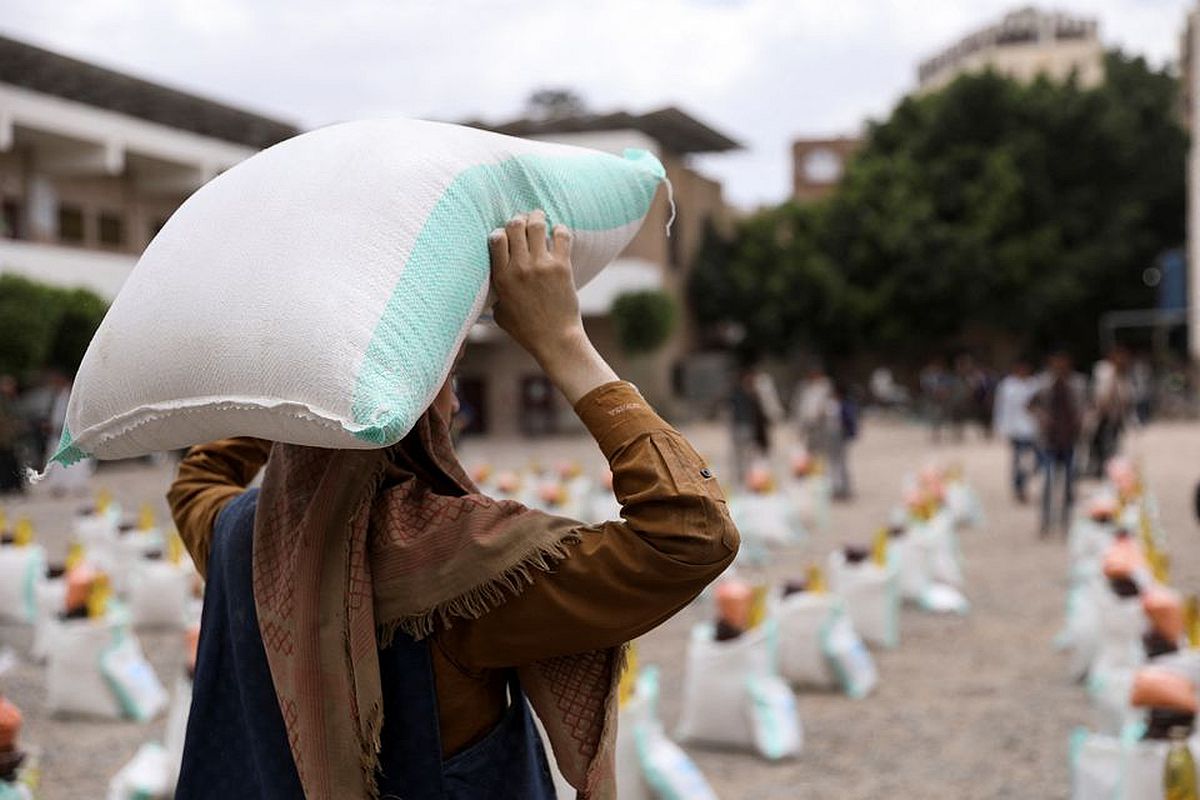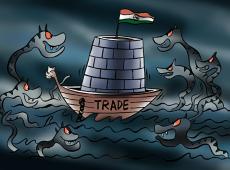WTO Meet: India Calls for Stricter Fishing Subsidy Rules
By Rediff Money Desk, ABUDHABI Feb 27, 2024 22:06
India advocates for a 25-year moratorium on distant water fishing subsidies at the WTO meeting, highlighting the harmful effects on sustainable fishing and advocating for the interests of local fishermen.

Photograph: Khaled Abdullah/Reuters
Abu Dhabi, Feb 27 (PTI) India at the WTO meeting here on Tuesday sought at least a 25-year moratorium on subsidies for distant water fishing while highlighting that such support measures have harmful effects on sustainable fishing.
During the World Trade Organisation (WTO) negotiation session on fisheries subsidies here, India also said that domestic fishermen follow sustainable fishing practices and any agreement on the sector should keep in mind the interests and welfare of the fishing community that depends on the marine resources for their livelihood and sustenance.
"India urged the members to introduce a moratorium on subsidies by Distant Water Fishing Nations for fishing or fishing-related activities beyond their EEZs (exclusive economic zones) for a period of at least 25 years," an official statement said.
India said that the members should not lose sight of the harmful effects of subsidies for large-scale fishing on sustainable fishing and management of marine resources.
Fishing beyond 200 nautical miles from the seashores of a country is termed distant water fishing.
India stressed that historically, while subsidies to the fisheries sector have led to over-exploitation, subsidies are also vital for developing countries and small economies to develop and diversify their fisheries sector as well as to protect the food security and livelihood security of their fishermen.
The issue is being negotiated here at the WTO meeting as the members are discussing to reach an agreement on disciplining subsidies that leads to overfishing and overcapacity. In 2022, the members finalised a pact on stopping subsidies for illegal, unreported and unregulated fishing activities.
New Delhi has also emphasised that any comprehensive agreement on fisheries subsidies should be built on the principles of Common But Differentiated Responsibilities and Respective Capabilities (CBDR- RC) and should also incorporate the provisions of Special and Differential Treatment (S&DT) appropriately, as is the case for all WTO agreements.
"India explained that the current approaches for addressing Over Capacity and Over Fishing (OCOF) is deeply flawed," it said.
Countries like Norway, China, Japan and the US undertake distant water fishing and provide huge subsidies to their fishing community.
During the World Trade Organisation (WTO) negotiation session on fisheries subsidies here, India also said that domestic fishermen follow sustainable fishing practices and any agreement on the sector should keep in mind the interests and welfare of the fishing community that depends on the marine resources for their livelihood and sustenance.
"India urged the members to introduce a moratorium on subsidies by Distant Water Fishing Nations for fishing or fishing-related activities beyond their EEZs (exclusive economic zones) for a period of at least 25 years," an official statement said.
India said that the members should not lose sight of the harmful effects of subsidies for large-scale fishing on sustainable fishing and management of marine resources.
Fishing beyond 200 nautical miles from the seashores of a country is termed distant water fishing.
India stressed that historically, while subsidies to the fisheries sector have led to over-exploitation, subsidies are also vital for developing countries and small economies to develop and diversify their fisheries sector as well as to protect the food security and livelihood security of their fishermen.
The issue is being negotiated here at the WTO meeting as the members are discussing to reach an agreement on disciplining subsidies that leads to overfishing and overcapacity. In 2022, the members finalised a pact on stopping subsidies for illegal, unreported and unregulated fishing activities.
New Delhi has also emphasised that any comprehensive agreement on fisheries subsidies should be built on the principles of Common But Differentiated Responsibilities and Respective Capabilities (CBDR- RC) and should also incorporate the provisions of Special and Differential Treatment (S&DT) appropriately, as is the case for all WTO agreements.
"India explained that the current approaches for addressing Over Capacity and Over Fishing (OCOF) is deeply flawed," it said.
Countries like Norway, China, Japan and the US undertake distant water fishing and provide huge subsidies to their fishing community.
Read More On:
DISCLAIMER - This article is from a syndicated feed. The original source is responsible for accuracy, views & content ownership. Views expressed may not reflect those of rediff.com India Limited.
You May Like To Read
TODAY'S MOST TRADED COMPANIES
- Company Name
- Price
- Volume
- IFL Enterprises
- 1.36 (+ 4.62)
- 96270207
- Franklin Industries
- 3.90 (+ 4.56)
- 27501642
- Vodafone Idea L
- 16.18 ( -3.63)
- 21311560
- Indian Renewable
- 259.90 ( -4.54)
- 14228151
- AvanceTechnologies
- 0.90 ( -1.10)
- 11518579
MORE NEWS

Wipro Transfers Stake in Financial Outsourcing...
Wipro Holdings (UK) has transferred its entire stake in Wipro Financial Outsourcing...

Indian Markets Turn Negative After Record Highs
Indian stock markets experienced volatility on Thursday, turning negative after...
ASK Property Fund Invests Rs 190 Cr in...
ASK Property Fund has invested Rs 190 crore in a real estate project being developed by...












 © 2024 Rediff.com India Limited. All rights reserved.
© 2024 Rediff.com India Limited. All rights reserved.